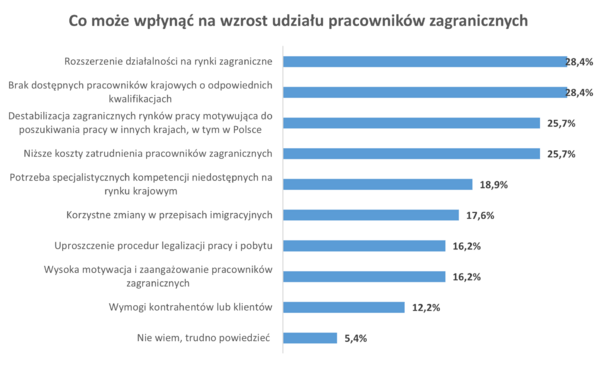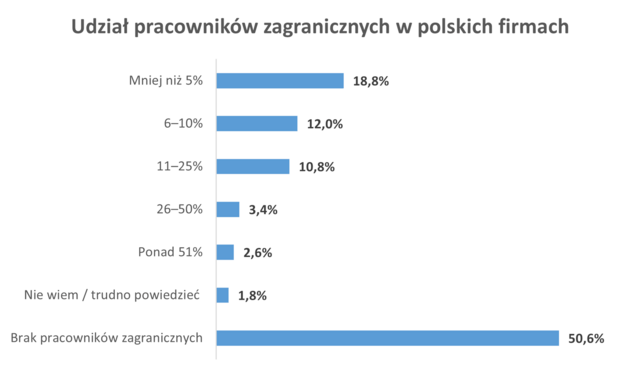Foreign workers help Polish companies navigate labour shortages and financial pressure
As labour shortages and financial strain weigh on Polish businesses, many entrepreneurs are turning to foreign workers to stabilise operations and reduce employment costs, according to a new survey by Keralla Research for BIG InfoMonitor.
The data reveals that nearly half of Polish entrepreneurs now employ at least one foreign national, with around 15% expecting their share of foreign workers to increase over the coming year. The construction and transport sectors are among those most reliant on foreign labour, as local hiring becomes increasingly difficult.
“For one in ten businesses, especially in transport and construction, finding new employees has become a top concern,” said Dr Waldemar Rogowski, chief analyst at BIG InfoMonitor. “The lack of qualified workers in Poland is pushing companies to look abroad—not only to fill vacancies, but also to stay competitive in increasingly challenging markets.”
The situation is particularly acute in firms employing between 50 and 249 people, where 14% reported difficulties in recruitment. Among micro and small enterprises, the problem is present in roughly one in eleven companies.
While foreign employees still make up a minority of the workforce in most firms, the numbers are growing. A quarter of surveyed companies said that foreign nationals now represent between 6% and 50% of their total staff—indicating teams of dozens, even hundreds. Most of these workers occupy operational roles, but their presence is becoming integral to business continuity, particularly in sectors where skilled domestic labour is in short supply.
Labour and Economic Pressures Driving Change
Rising inflation, energy and material costs, and slowing sales are compounding the pressure on companies. More than 38% of entrepreneurs cite inflation and general price increases as the biggest challenge this year, while nearly 30% point to the rising cost of raw materials and energy. Other concerns include maintaining financial liquidity (12%), the need to find new markets (16%), and falling revenues.
In this context, employment costs are also coming under scrutiny. Around 25% of business owners say they consider lower wage expectations to be a key advantage of hiring foreign workers. Additionally, demographic changes are shrinking the pool of working-age Poles. According to Poland’s Central Statistical Office, the number of working-age individuals dropped by more than 175,000 in 2024, falling to just under 22 million and accounting for 58.1% of the total population—down from 60.8% in 2000.
“Foreign workers bring not only manpower but also high levels of motivation and dedication,” Rogowski explained. “That’s increasingly important for employers who report difficulties in finding local candidates with the necessary skills and commitment.”
Payments and Liquidity Remain Persistent Challenges
Beyond recruitment, cash flow continues to hinder many Polish firms. More than 56% of entrepreneurs say that late payments from customers are affecting their financial condition. Nearly 80% report that they have contractors who regularly miss payment deadlines, and 46% of companies with deferred payment terms say they are currently waiting more than a month for invoices to be settled. Almost 30% report delays of up to two months.
These liquidity pressures, combined with demographic and economic constraints, are reinforcing the shift towards more flexible and cost-effective employment models. For many companies, that means relying more heavily on foreign labour.
Concerns About the Future
Not all firms see the trend continuing. Among those forecasting a decline in foreign employment, the most common reasons include rising hiring costs and customer preferences for Polish staff—cited by 27.6% of respondents. One in four companies also expressed concerns over increasing geopolitical instability, which may restrict the cross-border movement of workers.
Nevertheless, for a growing number of Polish businesses—particularly in sectors facing acute labour shortages—foreign workers are proving vital in maintaining productivity and adapting to the evolving demands of the national economy.
Source: BIG InfoMonitor











